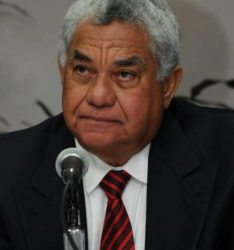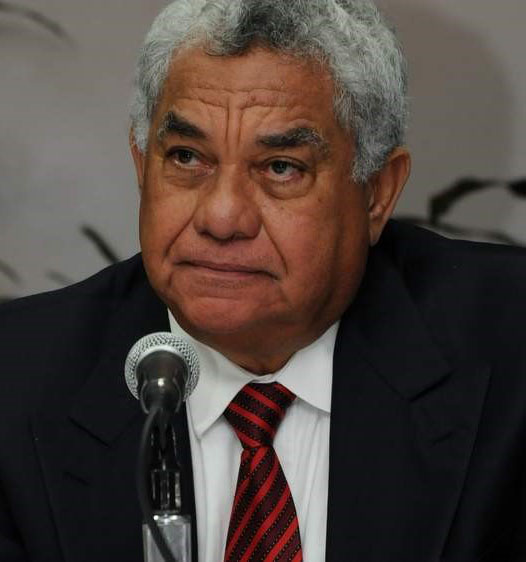(Trinidad Express) As creditors of CL Financial (CLF) queue up, the Government will have to wait in line to collect a little over $15 billion which it is owed from the conglomerate.
But joining the queue of creditors isn’t enough to get sums owed. As it stands, CLF just does not have the money to pay. CLF, which was once the largest conglomerate in T&T, has $90 million in its account as of July 31.
That’s in comparison to the sum owed to its creditors of $4.594 billion.
And that is exclusive of Government debt which stands at $15,609,033,654.

This was contained in a preliminary report signed by Marcus Wide, for and on behalf of the Joint Provisional Liquidators (JPLs) for CLF—international accounting firm Grant Thornton.
The JPLs were appointed to CLF on July 25 with the power, amongst others, to secure the assets and undertakings of CLF and to investigate the affairs of CLF.
The preliminary report, with respect to securing the assets and preliminary investigation into CLF, was submitted to the courts last Wednesday.
The report was compiled after the JPLs made a preliminary inspection of books and records, reviewed minutes of board meetings, reviewed recent minutes of the Audit Committee and reviewed the organisational chart identifying CLF’s holdings and subsidiary companies.
“Since our appointment as JPLs, we have become aware of significant debts on which current demands for payments have been made,” the report noted.
The JPLs report of CLF’s financial status dovetails with the affidavit submitted by Colin Soo Ping Chow, director of Ernst & Young Services Ltd, in support of the State’s case that the conglomerate is insolvent and should be wound up to pay taxpayers. Soo Ping Chow noted that CLF’s liabilities exceed its assets by $3.4 billion according to his examination of CLF’s 2017 management records.
CLF’s most valuable asset, its other insurance company—Colonial Life Insurance Company (CLICO)—remains under Central Bank management.
Claims on CLF
- A demand from Angostura Holdings Ltd for $984,559,444.73.
The JPLs noted that the sum appears in Angostura’s audited accounts and is shown as impaired in full.
It appears on CLF’s records as a debt due to a related party.
“Therefore, our initial view is that this is likely a valid demand and represents a current liability,” the report said.
- Claims by the Deposit Insurance Corporation (DIC), as liquidator of CLICO Invest- ment Bank (CIB) for $2,748,280,918.57 inclusive of a judgment of $1,187,000,000.
The JPLs noted that debt to CIB, as shown in the June 30 management accounts, is $1.487 billion, or some $1.26 billion less than the amount demanded: (a) The JPLs stated that the balance of the claim beyond the judgment “represents 12 additional advances or sets of transactions, which appear to be related party transactions involving guarantees provided by CIB on behalf of CLF commitments.
“We are advised that CLF has not accepted these as obligations of CLF, nor, from what we have seen to date, has CLF strongly contested them. In the time available, we have not been able to make a determination as to their validity.
“However, they appear at first instance to be well documented, suggesting that the claims may well survive further scrutiny. Given the time they have remained unresolved by CLF, it may be difficult to now refute them”.
(b) Both Angostura and DIC have made claims to CLF for losses on the sale of shares of Belvedere, a brand acquired by CLF.
The JPLs noted that it was “apparently financed by other entities, possibly including CIB and Angostura”.
(c) The DIC has made a demand for an accounting of dividends of CL World Brands (CLWB).
The DIC asserts that 20,331,165 shares are held in trust by CLF for the benefit of CIB.
In addition, DIC asserts that 12,911,414 shares of Home Construction Ltd are held in trust by CLF for the benefit of CIB.
- First Citizens Investment Services have made demands for promissory notes amounting to $862 million with a daily interest of $83,900.
- CLICO—$5.822 billion.
The JPLs noted that CLICO recently delivered a demand to CLF that shareholding “held in trust” for CLICO be turned over to it.
“In summary, there are demands for payment, of amounts totalling $4.594 billion in round numbers, which on their face are properly payable on demand.
“In addition, there is the unquantified demand for an accounting of dividends which it is asserted should have been payable to CIB and on-going daily interest on the First Citizen balances,” the report noted.
The JPLs noted that these claims “are before the obligations” to the Government.
Government’s $15 billion includes the CLICO balance of $5.8222 billion.
Where does CLF stand?
Liquidity and Deficiency
The JPLs noted that CLF’s bank accounts contain US$9,741,633.49 and TT$23,929,215.92 as of July 31, 2017.
“This cash balance is significantly lower than the balance shown in the last management accounts available to us as at June 30, 2017 or approximately $138 million, suggesting a continuing reduction of available cash to meet current liabilities.
“We have not conducted a detailed review of the profitability and cash flow contributions from CLF’s investments, but note the management accounts suggest that for the time being companies in which CLF is an investor, generate sufficient income to be self-sustaining in the period leading up to the hearing of the winding up petition.
“Thus, there is presently no reason for emergency intervention by the JPLs or other shareholders in these companies.
“On the other hand nor, in the short term to medium term, is there any opportunity for contribution that would significantly increase CLF’s liquidity by way of a distribution of earnings,” the report said.
The JPLs noted the Management Accounts at June 30, 2017, show a deficiency of assets over liabilities of $3.441 billion before taking into account additional claims by CIB and GORTT’s claim.
“This deficiency is, according to the notes to the accounts, despite recording the investment in subsidiaries at market value,” the report said.

